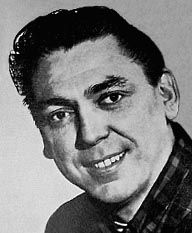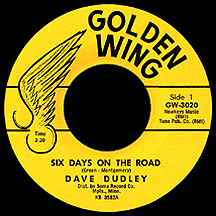DAVE DUDLEY
Six Days on the Road
Trucker songs have been popular for decades. There must be about as many big rig road warriors as there are honky tonks, cheatin' spouses and hard drinkin' brawlers, as all have been subjects of literally thousands of songs. Country music's trucker trend hit a peak in sales but a low point in quality with the CB radio craze of the mid-1970s. Now, I'm not saying there weren't some cool trucking songs. "Six Days on the Road," the hit that started the trend, is proof.
David Pedruska's original plan was to be a pro baseball player. He started during his teens with a team in Wausau, Wisconsin (near his home town of Spencer) and played for the short-lived Texas team the Gainesville Owls in the late 1940s, but an arm injury forced him to change vocations. Back in Wausau, Pedruska became a disc jockey and country singer. He called himself Dave Dudley and fronted a trio that traveled the midwest from 1953 to 1960. His first record, "Where There's a Will There's a Way," was released in 1959 on the NRC label. After that he was in a Minneapolis group called The Country Gentlemen and cut another solo 45 for the small Vee label, "Maybe I Do," which landed him on the C&W charts for the first time in October 1961. A year later the Jubilee single "Under Cover of the Night" went top 20 country, but those early ballads lacked something. So he came up with a gimmick in a grandstanding attempt to draw more attention.
While there were trucker songs prior to 1963 (one that comes to mind is Terry Fell's "Truck Driving Man" on the flip side of his 1954 hit "Don't Drop It"), the genre's first major hit was Dudley's "Six Days on the Road" on the Golden Wing record label, finally putting Dave on the map (or at least the highways that crisscross it). His booming baritone vibrated those tiny transistor radios and blasted out of 18-wheeler AM speakers from coast to coast in the summer of '63. Golden Wing, in business a couple of years, had finally released their big money-making record, a number two country hit and top 40 pop crossover.

The lyrics of the song reveal some questionable practices that are probably closer to reality than truckers would care to admit. One line, 'I'm takin' little white pills and my eyes are open wide,' didn't raise many eyebrows when the record first came out, but a general sensitivity about drug use prompted a change to "I'm passin' little white lines' in some later artists' versions (including Sawyer Brown's popular 1997 recording). Other lyrics had Dave (and, by proxy, his fellow truckers) stretching the limits of the law: 'There's a speed zone ahead well alright...I don't see a cop in sight' (so go ahead and push the speedometer to 80, Dave, why not?) and 'ICC is a-checkin' on down the line, well I'm a little overweight and my log book's way behind...but nothin' bothers me tonight, I can dodge all the scales alright...' (bend a few rules, you'll reach your destination quicker). Moral indiscretions are laid bare as well: 'It seems like a month since I kissed my baby goodbye...I could have a lot of women but I'm not a-like a-some of the guys...' In other words the song's writers, Earl Green and Carl Montgomery, were giving it to us straight, warts and all, about truck drivers. Listeners related. The truckers themselves loved it - afterwards, they were very well represented in the songs played by country music stations. A few of the leading artists in the '60s truck song consortium include Del Reeves ("Girl on the Billboard"), Dick Curless ("A Tombstone Every Mile"), Red Sovine ("Giddyup Go") and Red Simpson ("Roll Truck Roll").
Once "Six Days on the Road" became a smash, Mercury Records stepped in, pressuring Golden Wing to change its name due to what they considered possible infringements on the larger company's long-established Wing Records subsidiary. Against its better judgment, the label altered the name slightly to Golden Ring rather than risk a lawsuit, and the follow-up single "Cowboy Boots," written by Baker Knight, was released on that imprint, a minor pop entry but another huge country hit. Mercury suddenly became very interested in the singer, signing him to a contract. The association spanned ten years and more than two dozen hits (though he made no more appearances on the pop charts). Dave Dudley returned to truckin' from time to time (most notably with the 1965 hit "Truck Drivin' Son-Of-A-Gun") and finally landed that elusive number one country hit with "Pool Shark" in 1970.


